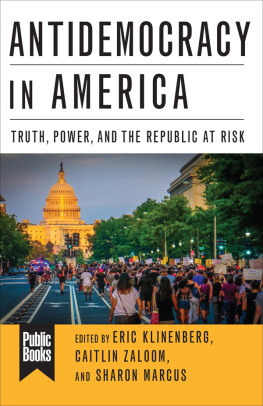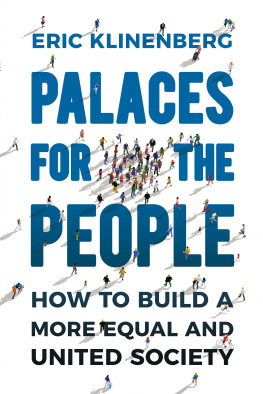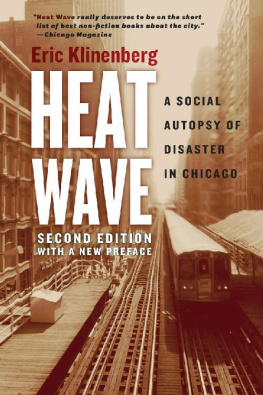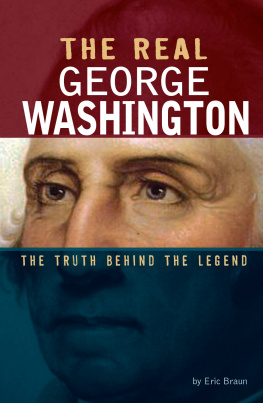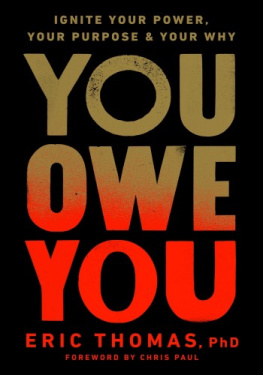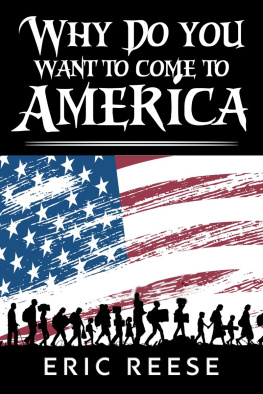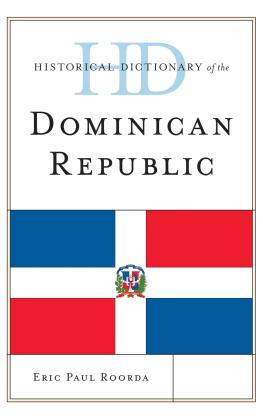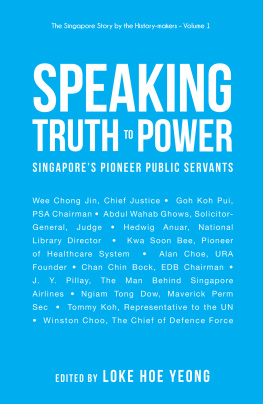ANTIDEMOCRACY IN AMERICA
Public Books Series
Sharon Marcus and Caitlin Zaloom, Editors
Founded in 2012, Public Books is required reading for anyone interested in what scholars have to say about contemporary culture, politics, and society. The monographs, anthologies, surveys, and experimental formats featured in this series translate the online experience of intellectual creativity and community into the physical world of print. Through writing that exemplifies the magazines commitment to expertise, accessibility, and diversity, the Public Books Series aims to break down barriers between the academy and the public in order to make the life of the mind a public good.
Think in Public: A Public Books Reader , edited by Sharon Marcus and Caitlin Zaloom, 2019
Antidemocracy in America: Truth, Power, and the Republic at Risk , edited by Eric Klinenberg, Caitlin Zaloom, and Sharon Marcus, 2019
ANTIDEMOCRACY IN AMERICA
TRUTH, POWER, AND THE REPUBLIC AT RISK
Edited by
ERIC KLINENBERG
CAITLIN ZALOOM
SHARON MARCUS
COLUMBIA UNIVERSITY PRESS
NEW YORK
Columbia University Press
Publishers Since 1893
New York Chichester, West Sussex
cup.columbia.edu
Copyright 2019 Eric Klinenberg, Caitlin Zaloom, and Sharon Marcus
All rights reserved
E-ISBN 978-0-231-54872-4
Library of Congress Cataloging-in-Publication Data
Names: Klinenberg, Eric, editor. | Zaloom, Caitlin, editor. | Marcus, Sharon, 1966 editor.
Title: Antidemocracy in America : truth, power, and the republic at risk / edited by Eric Klinenberg, Caitlin Zaloom, and Sharon Marcus.
Description: New York : Columbia University Press, [2019] | Series: Public books series | Includes bibliographical references.
Identifiers: LCCN 2018061396 (print) | LCCN 2019002481 (ebook) | ISBN 9780231190107 (cloth : alk. paper) | ISBN 9780231190114 (pbk. : alk. paper)
Subjects: LCSH: United StatesPolitics and government2017 | ConservatismUnited StatesHistory21st century. | Trump, Donald, 1946 | Political cultureUnited States21st century.
Classification: LCC E912 (ebook) | LCC E912 .A58 2019 (print) | DDC 306.20973/0905dc23
LC record available at https://lccn.loc.gov/2018061396
A Columbia University Press E-book.
CUP would be pleased to hear about your reading experience with this e-book at .
Cover design: Julia Kushnirsky
Cover photo: Ted Eytan, MD
Book design: Lisa Hamm
CONTENTS
ERIC KLINENBERG
MICHELLE WILDE ANDERSON
LISA WADE
THOMAS J. SUGRUE
VICTOR PICKARD
SASKIA SASSEN
ALINA DAS
OONA A. HATHAWAY AND SCOTT J. SHAPIRO
RICHARD SENNETT
PEDRO NOGUERA
FRED TURNER
CRAIG CALHOUN
MARGARET LEVI
SHAMUS KHAN
GRETCHEN BAKKE
PATRICK SHARKEY
LINDA GORDON
ROBERT SHRUM
PHILIP GORSKI
TANYA MARIE LUHRMANN
HAREL SHAPIRA
ASHLEY FARMER
DOUGLAS S. MASSEY
STEVEN LUKES
MICHELLE JACKSON AND DAVID B. GRUSKY
DANIEL ALDANA COHEN
WENDY BROWN
JUDITH BUTLER
MICHELE LAMONT
JACK HALBERSTAM
JEFFERSON COWIE
WILLIAM JULIUS WILSON
ERIC KLINENBERG
T his book, which I edited with Sharon Marcus and Caitlin Zaloom of Public Books , is a collective effort to assess the presidency of Donald Trump and the effects of Americas unsettling turn toward authoritarian rule. Its a call for us to pull back from the deluge of tweets and breaking news stories that turn each day into a political drama, to consider the big picture thats slowly emerging from the dark places we inhabit today.
How did we get here? Decades of economic stagnation and rising inequality have rekindled support for antidemocratic political parties throughout the developed world. Nativism, ethno-nationalism, and the misogyny and homophobia that accompany them have fueled the campaigns. In recent years, European nations have harbored and succumbed to authoritarian movements. And on November 8, 2016, citizens of the worlds strongest democratic nation elected a reality-television star and real-estate tycoon with no previous governing experience to be their president. It was, by any stretch of the imagination, an extraordinary leap into the unknown for America and, by virtue of its hyperpower status, for the rest of the world.
The articles in this book, written by many of the nations leading social scientists and humanists, leverage the power of scholarly knowledge to explore the causes, consequences, and meanings of this dark turn. They also point to ways forward. But the essaysincluding this one, which Sharon and Caitlin contributed to and shapedare motivated by a set of recent events that are worth cataloguing so that we can establish the context for our inquiry.
Donald Trump launched his political career by questioning the citizenship of the nations first African American president, Barack Obama. He campaigned for office by promising to enact policies antithetical to open societies: curbing civil rights and liberties, including free speech; building a massive southern border wall; limiting the franchise; imprisoning reporters; reducing oversight of police violence and the criminal-justice system; and allying with dictators and thugs. He was aggressively nativist, impugning the character of Mexicans and Arabs and denigrating Jews and blacks. He was unapologetically misogynist, for gun rights, and against reproductive rights. He led rallies where he encouraged supporters to physically injure his political opponents. Trumps supporters chanted: Build a wall! and Lock her up!
Trump demeaned government and the professional public servants who work for it. He pledged to blow up the system: terminating trade agreements and climate treaties, pulling back from international diplomacy, putting America first. He denied the validity of established science, particularly on climate change. He said hed revive the moribund coal industry, return factories to the rust belt, let oil companies drill in the oceans, and rebuild a massive fossil-fuel pipeline that his predecessor had rejected. He promised to protecteven expandthe rights of gun owners and to roll back the rights of women to control their own bodies and lives.
Like Bernie Sanders, the surprisingly popular socialist candidate who nearly won the Democratic nomination, Trump claimed to champion those left behind by globalization, deindustrialization, and the financial economy. Unlike Sanders, though, Trump welded his populist message to an exclusionary, racist one, galvanizing the alt-right and other openly bigoted forces previously on the fringe of American life. Whats more, he did it dishonestly, by promising to restore a past that can never returnnot least because it never existed in the first place.
We went for it. Not all of us. Not even most of us. But you dont get into the White House by winning the popular vote. You get there by winning the Electoral College, and Trump did, by a commanding margin. In January 2017, he became the nations forty-fifth president. Americans, including many who voted for him, braced for the storm Trump would bring.
In office, as in the electoral campaign, President Trump has repeatedly attacked sacred Enlightenment projects, including science, journalism, and the relentless pursuit of truth. He has propagated misinformation. He has complimented and cozied up to despots across the planet, including Vladmir Putin and Recep Tayyip Erdogan, and has insulted leaders of open democratic societies with whom the United States has long been allied. Trump has advocated slashing public support for medical research, climate science, laboratory science, social science, the humanities, and the arts. He has ordered that vital research on health, the environment, and security be halted or revised. He has demanded that important public data be discarded and erased.


